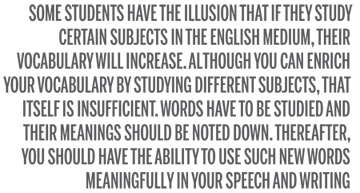
Unknown to many people, your success in any field partly depends on the number of words you know. Unfortunately, most young people today are not interested in improving their word-stock. They want to study a number of subjects and pass examinations. As a result, even some educated people have a limited vocabulary sufficient for them to carry out their duties. Those who teach the English language and literature know the great benefit of an enriched vocabulary.
 Some students fail to complete their studies mainly because they are unable to express themselves in writing. A young man – let’s call him Brown – always wanted to be a doctor, but he could not gain admission to a university because of his poor vocabulary. His vocabulary was tested at the Human Engineering Laboratory in Boston which tests people for aptitudes and word knowledge. Poor Brown scored only 23 percentile. He was told that to be a physician he had to score at least 75 percentile.
Some students fail to complete their studies mainly because they are unable to express themselves in writing. A young man – let’s call him Brown – always wanted to be a doctor, but he could not gain admission to a university because of his poor vocabulary. His vocabulary was tested at the Human Engineering Laboratory in Boston which tests people for aptitudes and word knowledge. Poor Brown scored only 23 percentile. He was told that to be a physician he had to score at least 75 percentile.
Some students have the illusion that if they study certain subjects in the English medium, their vocabulary will increase. Although you can enrich your vocabulary by studying different subjects, that itself is insufficient. Words have to be studied and their meanings should be noted down. Thereafter, you should have the ability to use such new words meaningfully in your speech and writing. If you do not use the words you have learned, you will forget them easily. As a student, I used to note down difficult words with their meanings in my notebook. Then I used them in sentences and got them corrected by my teachers.
Standard dictionary
Vocabulary can be enriched on your own. What you need is a standard dictionary and a burning desire to learn new words. The habit of referring to a dictionary has to be cultivated early in life. I remember carrying a dictionary to school. Even after leaving school, I used to carry a pocket dictionary in my travelling bag. Times have changed and the pocket dictionary has been replaced by a mobile phone.
There are some people including teachers who never use a dictionary. Without a dictionary, you cannot learn the meaning of new words and how to use them correctly. In this respect, ‘Oxford Advanced Learner’s Dictionary’ is an ideal companion because it gives the meanings and how to use words in sentences. In addition to the dictionary, there are many books to help you to expand your vocabulary. As a student I used Johnson O’Connor’s ‘Vocabulary Builder’ which listed words in order of difficulty. It gave clear definitions of words. Although this book is no longer available, I have seen a host of other books to help you with vocabulary building.
To improve your vocabulary, you have to read newspapers, magazines and books apart from your textbooks. Language is an expanding canvas and new words are being added every now and then. ‘Permacrisis’ is one of the new words added to English recently. In fact, it is the word of the year. The word refers to a never ending cycle of crises. For example, the Covid-19 pandemic was followed by climate change.
Today, some countries are grappling with Monkeypox. When once you find a vaccine to prevent its spread, another crisis will occur. Today, we are inundated with political chaos and financial scandals. The cycle of crisis will never end. Collins Learning Managing Director Alex Beecroft said, “Permacrisis sums up quite succinctly just how truly awful 2022 has been for many people.”
The latest edition of the ‘Collins Dictionary’ has included many other new words. One such word is ‘partygate’ which refers to the incidents that led to the resignation of former British Prime Minister Boris Johnson who flouted pandemic lockdown rules in 2020 by having a party at his Downing Street official residence. Another word currently being used is ‘sportswashing.’ It comes handy when a Government or an organisation uses sports to divert the public attention from its poor human rights record. Examples have been cited from Saudi Arabia and Qatar. Another new word found in the dictionary is ‘quiet quitting’ which refers to the practice of not going above and beyond at work as a response to not being treated well by your employer.
Exciting hobby
Collecting such new words is an exciting hobby. Even if you are not going to be a writer or teacher, your enriched vocabulary will be useful in any activity you will engage in. The young man named Brown, referred to earlier, improved his vocabulary after several years and entered the University of Pennsylvania and passed out as a physician. Even after becoming a physician, he did not stop collecting and remembering new words and phrases.
The close relationship of vocabulary and success in life was established when Johnson O’Connor discovered that vice presidents of leading companies such as Eastman Kodak, General Motors and General Electric showed a wider knowledge than some university professors, lawyers and physicians. His research elicited the fact that high achievers in any field scored high in vocabulary. Even some musicians, mathematicians and architects had a very good stock of words.
The cardinal rule appears to be that vocabulary determines how far you can go. Sometimes students ask why they should know so many words. They fail to realise that words are the instruments with which we grasp the thoughts of others. In addition, we do our thinking with a wide variety of words. When we read, listen to others, speak or write something, we use words. For all such activities, you need a good vocabulary. You cannot become a competent communicator without an outstanding vocabulary. You will realise the difference when you read a book written by a veteran and a feature turned out by a young journalist.
Widen your interests
There are many ways to improve your vocabulary. The most natural way is to widen your interests. When you are young, you tend to read anything and everything with absorbing interest. Youngsters are very curious to know the meaning of words. However, the average adult is not much interested in widening his interests. He is satisfied with his job and his mind is resigned to ignorance on many subjects. Therefore, if you are interested in enriching your vocabulary, you should not fall into this category.
It is impossible for anyone to commit a dictionary to memory. There is absolutely no need to do so. When you read books and newspapers, you will learn new words without much effort. Constant use of such words will help you remember them easily. Whatever you do, do it with pleasure. This rule applies to enriching your vocabulary as well. Do not think that learning new words is bone-hard work. If you love words, you will remember them very easily.
When you learn a new word, study other words in the same family. For instance, the word ‘economy’ is a nucleus around which cluster ‘economise, economics, economist’ and ‘economical.’ If you are ambitious to improve your vocabulary, learn at least one new word every day. In addition, read word power columns in newspapers and magazines. If you are a lover of English, your progress will be much faster.
